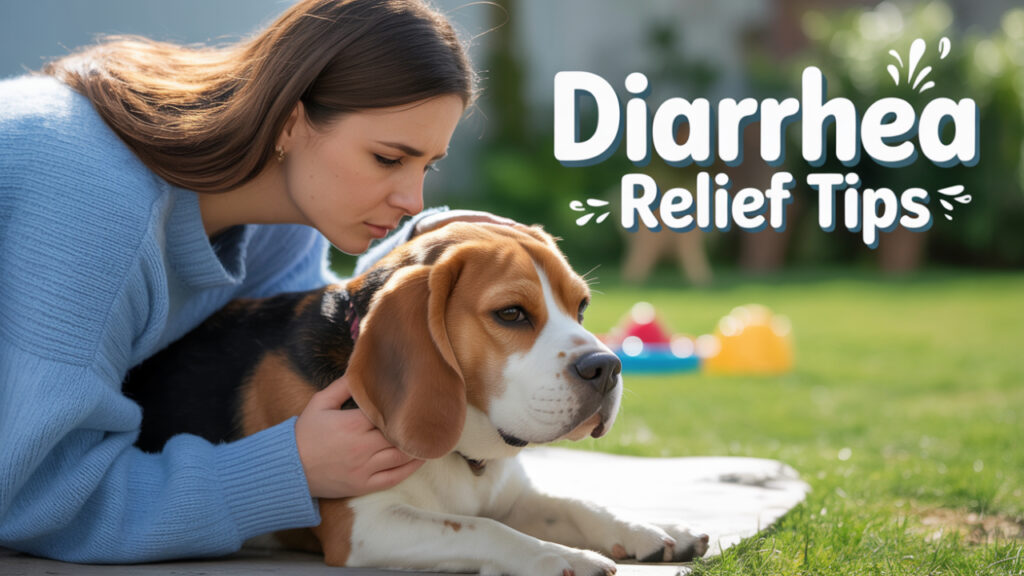Typical causes are dietary changes, stress, or infections. First, it’s important to understand what the root cause is, as this will assist you in deciding your next steps. Bland food, like boiled chicken and rice, can soothe the symptoms of minor ailments. Hydration is key to prevent dehydration. When more severe, a visit to the vet is advised for guidance and medication. Knowing these treatment approaches can assist dog owners in tackling their dog’s upset stomach efficiently, helping their four-legged companions bounce back and get back to normal in no time.
Decoding Your Dog’s Discomfort
Know what to do if your dog’s stomach becomes upset. There are different reasons behind this discomfort such as infections, changes in diet and health problems. Being able to identify these signals can be very helpful in intervening early.
Obvious Signs
The classic signs of a dog’s stomach upset are repeated vomiting, diarrhea and refusal to eat. These are symptoms that commonly indicate your dog is having a stomach ache. For instance, if your dog is vomiting more than one time in a few hours, or has watery stools — those are obvious indicators that there is an issue. Observing these symptoms early can assist you in taking swift measures to combat the problem.
IBS or diet can worsen a dog’s discomfort. If your pooch has eaten something they shouldn’t have, like human food or garbage, it can induce instant symptoms.
Subtle Clues
No matter what the symptoms – whether obvious or subtle clues, your dog may be in pain. Notice any deviation from your dog’s regular habits. If they appear lethargic or more reclusive than usual, this can indicate some level of discomfort.
Unusual sleeping patterns or heightened sensitivity to touch can be a clue to an upset stomach. For example, if your dog flinches when you pet their stomach, it might indicate pain. Monitoring their behavior can help clue you into your dog’s condition.
Other times, dogs will be uncomfortable without any obvious symptoms. They might be pacing or unwilling to rest, which shows discomfort. Know your dog’s regular behavior and you’ll spot any anomalies.
Behavioral Shifts
Gastro-intestinal distress is usually accompanied by behavioral changes. Or maybe your dog seems anxious or listless, wandering around the house or hiding. They could even get testy, nipping at reaches to pet them.
Motion sickness or vestibular episodes, as you may guess, can make dogs queasy traveling. By decoding these behavioral changes you can figure out why they are suffering and get them the help needed.
Stool Signals
Keeping track of your dog’s stool can be an important indicator of his gastrointestinal health. Odd stool consistency, as in either loose or overly hard, can be a sign of tummy troubles.
The number of bowel movements is important. If your dog is straining or hasn’t pooped in over a day, pay attention.
Vocal Cues
Whines, howls and barking are vocalizations that can indicate distress. Whining, growling or excessive barking can tell you that your dog is uncomfortable.
If they appear to be vocalizing more than normal, be sure to check their general condition and visit the vet if necessary.
Why Is My Dog’s Stomach Upset?
There are a lot of different reasons that your dog might have an upset stomach. Knowing what’s going on is key to managing and recovering.
Dietary Indiscretion
Dietary indiscretion is a common stomach upset culprit. Dogs are scavengers and will eat the wrong things such as spoiled meat, human food or even poisonous plants. These symptoms can cause vomiting and diarrhea.
A quick switch of food can do a number on a dog’s tum. If you’re introducing new food, do so gradually over 1 – 2 weeks. This gives their digestive system time to adjust, reducing the risk of stomach upset. For instance, if you go from a chicken kibble to a fish one, blending the two together over time can alleviate the shift.
Underlying Stress
Stress is a big factor in a dog’s tummy itis. Environmental changes, such as going to a new home or welcoming a new family member, can be stressful. This stress can cause tummy upset or appetite changes.
Stressed out dogs bark like crazy or hide. If it’s stress, treat it through slow desensitization to the stressor and a calm environment. Sometimes, a trip to the vet for behavior solutions can be helpful.
Gut Imbalance
Gut health matters when their gut bacteria are out of whack. Gastroenteritis, for example, can be caused by infections, allergies, or intestinal parasites like worms or Giardia.
Symptoms of gut imbalance vary from mild to severe. If your dog experiences extended vomiting or diarrhea, it’s especially important to fast for a few hours – up to 24 is ok – to give their digestive tract a break. After that, begin introducing a bland diet.
Breed Predisposition
Some breeds may be more susceptible to stomach issues than others based on their genetics. For example, some breeds, such as German Shepherds and Boxers, are more prone to food sensitivities or GI issues.
Observing your dog’s reactions to certain foods is key. If you observe recurring ingredient issues, it might be time to explore specialized diets or seek professional veterinary guidance.
Immediate Dog Upset Stomach Relief
Immediate dog upset stomach relief. There are a few great ways to calm their tummies and help them feel better. Here’s what to keep in mind.
The 24-Hour Reset
Giving your dog’s digestive system a break by withholding food for 12–24 hours helps the lining to repair itself. This fasting period is usually good for older puppies as well, as they can fast for up to 12 hours without issue. In the meantime, do keep an eye on your dog for any symptoms of distress. If your pet exhibits severe pain or if symptoms continue beyond the fasting period, you should consult a veterinarian.
Hydration Helpers
Keeping hydrated is essential. Small, frequent amounts of water stave off dehydration in nauseous dogs. Prevent your dog from gulping down large amounts of water at once, as this can exacerbate the condition. If your dog’s stomach is still unsettled, try giving a mix of water with some slippery elm powder (roughly ¼ tsp per 10 lbs). This can comfort their tummy, assisting healing while keeping them hydrated.
Bland Diet Basics
Once the fast has passed, feeding is critical. Bland food, such as cooked white rice and boiled chicken or white fish, can be easy on the stomach. This way you give nutrients without irritating. If diarrhea is a problem, fiber such as canned 100% pumpkin puree or fiber powder may be added to help keep it at bay. Slowly returning to regular food over a couple of days will help prevent relapse stomach upset.
What to Avoid
There are some foods and activities to steer clear of during this recuperation period. No rich or fatty foods, no dairy or ‘treats’ as these can further the upset stomach. Abrupt diet changes can exacerbate things. If symptoms persist or worsen, you’ll need immediate veterinary care to avert complications like serious dehydration.
Advanced Gut Health Strategies
Treating a dog’s upset stomach is complex. They’re advanced strategies that help improve digestion and overall wellbeing.
Targeted Probiotics
Probiotics are a powerful gut health aid by reintroducing the balance of bacteria. Certain strains, such as Lactobacillus and Bifidobacterium, have been shown to aid in digestion and alleviate digestive discomfort.
If you do decide to give your dog probiotics, make sure you choose ones that are marketed to pets. These are better than human ones. For instance, enterococcus faecium products have been promising in relieving diarrhea. Either way, they can help your dog bounce back from digestive disturbances more quickly and avoid them in the future!
Begin with a low dose and then increase to see how your dog responds. Keeping track of their response aids in figuring out the appropriate strain and amount for their individual needs.
Food Elimination Trials
Dog digestive issues often stem from food allergies or intolerances. A food elimination trial will clue you in to these problems. This basically entails putting your dog on a limited ingredient diet — usually one protein and one carb — for a few weeks.
Typical proteins found in these trials are duck or venison and sweet potatoes or peas for carbs. Once the trial is over, add back foods slowly to identify triggers.
Remember, then, that this process can be slow and patient. For some dogs, there may be multiple food items that cause a reaction so it is important to track any changes in behavior and stool while going through this process.
Stress Reduction
Stress can wreak havoc on a dog’s digestive health. Additionally, an environmental change, new schedule or even a new pet can cause anxiety, which is a very common source of tummy upsets.
Stress reduction can help. Daily walks, for example, are crucial to a dog’s mental and physical health. Daily walks or playtime can reduce anxiety and promote security.
Setting a serene vibe helps as well. Create a retreat for your dog when feeling claustrophobic. Think about calming aids such as pheromone diffusers or anxiety wraps that will give comfort in stressful moments.
Meds for Dog with Upset Stomach
5 Best Meds for Dog with Upset Stomach Whether it’s OTC or prescription from your vet, knowing what’s out there is key.
Over-the-Counter Cautions
There are some over-the-counter options, but you should be very careful before giving any medication. Certain OTC meds, such as Pepto-Bismol or Famotidine, can assist with stomach irritation. Dosage is key, as overdosing can cause other problems. Make sure to talk to your vet before using these products, as some of the ingredients may not be safe for all dog breeds or sizes.
Additionally, be sure to monitor for allergic reactions or side effects. For instance, if your dog experiences vomiting, lethargy, or behavioral changes following an OTC drug, stop its use and consult a veterinarian immediately. Certain human medications can interfere with other prescriptions your dog could be on, so confirming with a vet can protect against dangerous interactions.
Veterinary Medications
Vet meds tend to be better for dog upset stomach. Common examples are Metronidazole or Ondansetron. These meds address specific culprits, like intestinal infections or nausea. Veterinarian will be able to determine the root cause and suggest the best treatment for them based on their health history and current condition.
Other medications a vet may prescribe are probiotics to restore gut health and anti-nausea meds. If a dog has chronic issues, the vet may recommend a specialized diet in addition to medicines that address the underlying cause.
Understanding the symptoms of a more serious condition, like continual vomiting, diarrhea, or bloody stool, is important. These cases typically require urgent vet care, and postponing treatment can result in life-threatening danger.
When to Call the Veterinarian
Knowing when to call the vet with dog upset stomach is important. A few signs mean medical attention is imperative to safeguard your pet’s health.
Red Flag Symptoms
If your dog exhibits any of the following signs, it’s time to call your vet pronto.
- Persistent vomiting, especially if it contains blood or bile.
- Severe diarrhea that continues for a day or longer, especially if it contains blood.
- Signs of pain, such as whining, refusal to move, or hunching.
Extended vomiting or diarrhea can cause dehydration which is extremely dangerous. So, for example, if your dog is floppy and rejecting water, this is a red flag for emergency care. If your dog’s belly is distended or painful to palpation, it could be a sign of something dangerous lurking inside — one that needs to be evaluated immediately.
High-Risk Dogs
Some breeds and age groups are more susceptible to GI problems. Puppies, for instance, possess immature digestive systems and can rapidly contract infections or parasites. Older dogs can have prior health problems impacting their stomach health and digestion as well.
In addition, breeds like Great Danes or Boxers are prone to life-threatening conditions like bloat that require immediate attention. If your dog is one of these categories and is exhibiting signs of an upset stomach, play it safe and call your vet sooner rather than later.
No Improvement
If you’ve taken some at-home measures, i.e., fasting your dog for 12 to 24 hours and there’s no response, this is worrisome. If the upset stomach lasts longer than this, your dog may require additional examination.
When mild symptoms subside but then return, this is another good sign that veterinary intervention is necessary. For instance, if your dog experiences a short case of diarrhea that comes back after a few days, something more serious may be going on that needs to be explored.
Remember these tips to help protect your dog’s well-being.
Conclusion
Knowing about your dog’s upset stomach helps you act fast. Knowing when your dog is hurting so you can nurse him back to health. Home remedies and diet changes can give fast relief. When these don’t do the trick, medications can assist in relieving their discomfort. Monitor your dog’s symptoms at all times and understand when it is necessary to consult a vet.
Just by doing so, you can make your dog’s life better and more comfortable. Being proactive makes a difference in their recovery. As a dog owner, being prepared for these challenges fosters a more powerful connection with your pup. Stay educated, take action early and put your dog’s health first.
Frequently Asked Questions
What are common signs of an upset stomach in dogs?
Typical symptoms are vomiting, diarrhea, loss of appetite and lethargy. You might observe your dog pacing or whining as well.
What can I give my dog for an upset stomach at home?
You could attempt a home-cure by feeding them bland, boiled chicken and rice. Make sure they’re getting lots of fresh water. Always check with your vet before attempting home remedies.
How long does an upset stomach last in dogs?
Upset stomach typically persists for 1 to 3 days. If symptoms last longer than that, or intensify, see your vet for additional examination.
Are there specific foods that help a dog’s upset stomach?
Certainly, bland foods such as boiled chicken, rice and canned pumpkin can be reassuring. Stay away from dairy and fatty foods, which can make it worse.
When should I seek veterinary help for my dog’s upset stomach?
Consult your vet if symptoms persist for over 24 hours, your dog appears severely lethargic, or there’s blood in the vomit or stool.
Can stress cause an upset stomach in dogs?
Totally. Stressful events, including a shift in routine or environment, can bring on stomach problems. Minimizing stress is key to your dog’s digestive well-being.
What medications are safe for dogs with upset stomachs?
A few OTCs such as famotidine can be safe and should only be administered under veterinary direction. Of course, always consult your vet before administering any medication!





